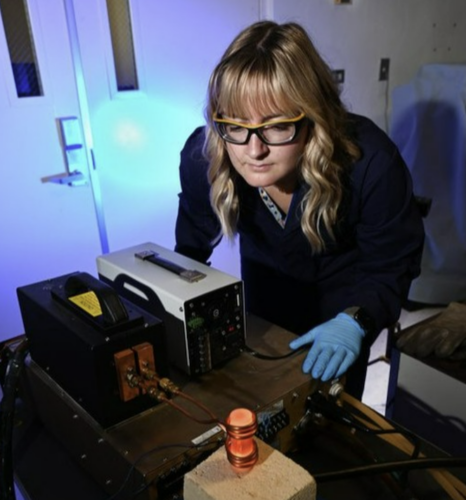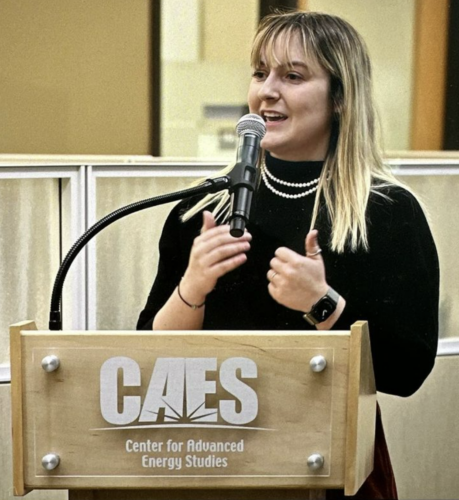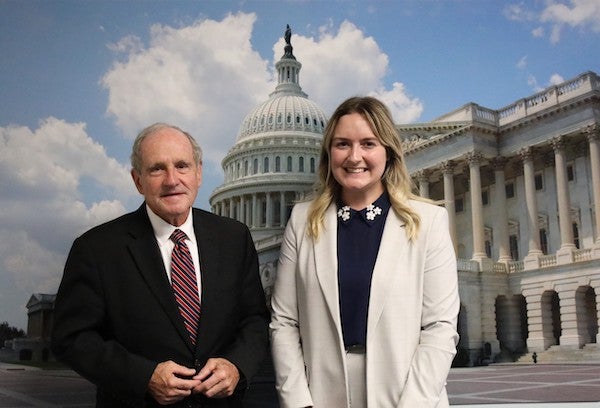
“There’s a lot that we can change for the better in America with nuclear energy and I always like to tell people ‘at the end of the day, it’s just a big boiling pot of water.”
That’s Kaelee Novich, a fourth year doctoral student in Boise State’s Advanced Materials Laboratory in the Micron School of Materials Science and Engineering. At the time of this interview, she took my call from the Department of Energy headquarters in Washington, DC where she is completing a fellowship with the National Nuclear Security Administration (NNSA).
Despite her youth, she’s been conducting nuclear energy research since her early 20’s. Novich’s first nuclear project at Boise State University was researching, developing, and characterizing materials for dry-cask cooling solutions to enable passive, long-term spent nuclear fuel rod storage. Before she graduated with her bachelors degree, she was already designing and testing sensors for monitoring of structural health of nuclear fuel rods with an undergraduate research internship at the Idaho National Laboratory (INL).
Inspired and motivated by her experience, she then committed herself to the pursuit of a graduate degree in Materials Science and Engineering and was awarded, yet another, INL opportunity; a graduate research internship funded by the Nuclear Energy University Program.
Her mentor and head of the Advanced Materials Laboratory, assistant professor Brian Jaques says “Kaelee Novich is a rock star, and she’s probably the most passionate person about nuclear energy and our energy future.”

There can be little doubt. When speaking with her about nuclear energy, Novich’s own enthusiasm and knowledge of nuclear energy and security bubbles up.
“I’m hooked. I’m always going to be a nuclear energy advocate. No other energy source will be able to meet these really hard achieving goals that we have set for, which is being a ‘Carbon Free’ country by the 2050s,” she said.
In addition to tackling carbon neutrality goals using nuclear energy, she emphasizes another nuclear goal of implementing micro-reactor designs for remote power solutions, such as military bases or remote communities. These small “micro” units could fit on the back of a semi truck while still being powerful enough to provide energy for entire communities after a disaster, such as a hurricane.
Her passion for the field could not come at a more critical time as the world tackles ambitious goals of reducing the rate of climate change and ensuring that everyone has access to clean energy.
In the nuclear power industry, there is an extreme deficit of skilled workforce as half of the nuclear workforce are reaching retirement age in a wave that is being referred to as “the silver tsunami.” To complicate matters, the United States did not invest heavily in nuclear power after the Cold War, until the early turn of the century. The end result is that much of America’s nuclear power infrastructure, budget, technology, policy, security and workforce is in need of modernization.

Novich says these challenges are both a cause for concern as well as an opportunity for young nuclear researchers.
“A lot of our reactors are about 50 years old, and we’re gonna have to start training and giving a history debrief to all of those who are coming in, because we can’t lose that knowledge. ‘How do we operate it? How do we continue to modernize?’” Novich said. “It’s challenging when you are missing that age group that could support it, but I also think it’s exciting at the same time because it also allows a lot of us who are about to start our young careers in nuclear energy to be able to become leaders fairly quickly.”
-Written by Brianne Phillips, photos provided by Novich
Boise State’s Engineering Innovation Lab
Another skill that pushed Novich ahead was the technical expertise she honed in Boise State’s Engineering Innovation Lab, managed by Griff Allen.
“Shout out to Griff because without him I wouldn’t have had the technical background and the machine shop understanding. I got to learn the mill, the lathe, how to MIG weld and that’s really cool because I don’t know a lot of other female engineers who have that experience. Now I get to talk to other technicians and they see ‘Oh, she understands what I’m saying.’ It’s so important that we close those communication gaps if we are going to expand nuclear energy to meet our climate change goals,” Novich said.
Check out the studio!